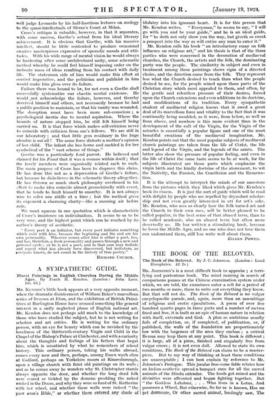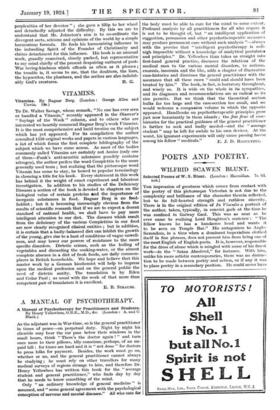THE BOOK OF THE BELOVED.
MIL JOHNSTON'S is a most difficult book to appraise ; a terri- fying and portentous book. The mind running in search of comparisons pauses at the Chinese examination system under which, we are told, the examinees enter a cell for a period of two months or more, there to write out everything they know. But that will not do. The Book of the Beloved is no vulgar encyclopaedic parade, and, again, more than an assemblage of religious and erotic ejaculations. A poem of over five hundred quarto pages in three parts and a number of metres fixed and free, it is built as an epic of human nature in relation with itself, externals and God. A plan so ambitious usually fails of completion, or, if completed, of publication, or, if published, the walls of the foundation are proportionately low with the largeness of the area they enclose ; a critical Remus may leap them at any point. This book is different ; it is large, all of a piece, finished and singularly free from vulgar errors ; it is not even dull. Allowed to state its own conditions, The Book of the Beloved can claim to be a master- piece. But to my way of thinking at least these conditions are unacceptable ; I can best explain by reference to Mr. Johnston's Prologue. This jocular free-verse fable relates how an Indian aesthetic spread a banquet once for all the sacred animals of the Hindu calendar. The foods got mixed and the divinities were affronted and began fighting together. But " the Goddess Lakshmi, . . . Who lives in a Lotus, And possesses a Wheel, But otherwise, So far as is known, Has no net dormouse, Or Other sacred animal, Smilingly saw, The
perplexities of her devotee " ; she gave a fillip to her wheel and detachedly adjusted the difficulty. By this we are to understand that Mr. Johnston's aim is to co-ordinate the divergent sects, schisms and opinions of the world by a simple harmonious formula. He finds his harmonizing influence in the indwelling Spirit of the Founder of Christianity and claims detachment for this influence. His book is an unusual work, grandly conceived, closely packed, but representative to my mind chiefly of the present despairing outburst of post- War loving-kindness which offends as often as it pleases ; the trouble is, it seems to me, that the doubters, the liars, the hypocrites, the pharisees, and the scribes are also indubit-











































 Previous page
Previous page